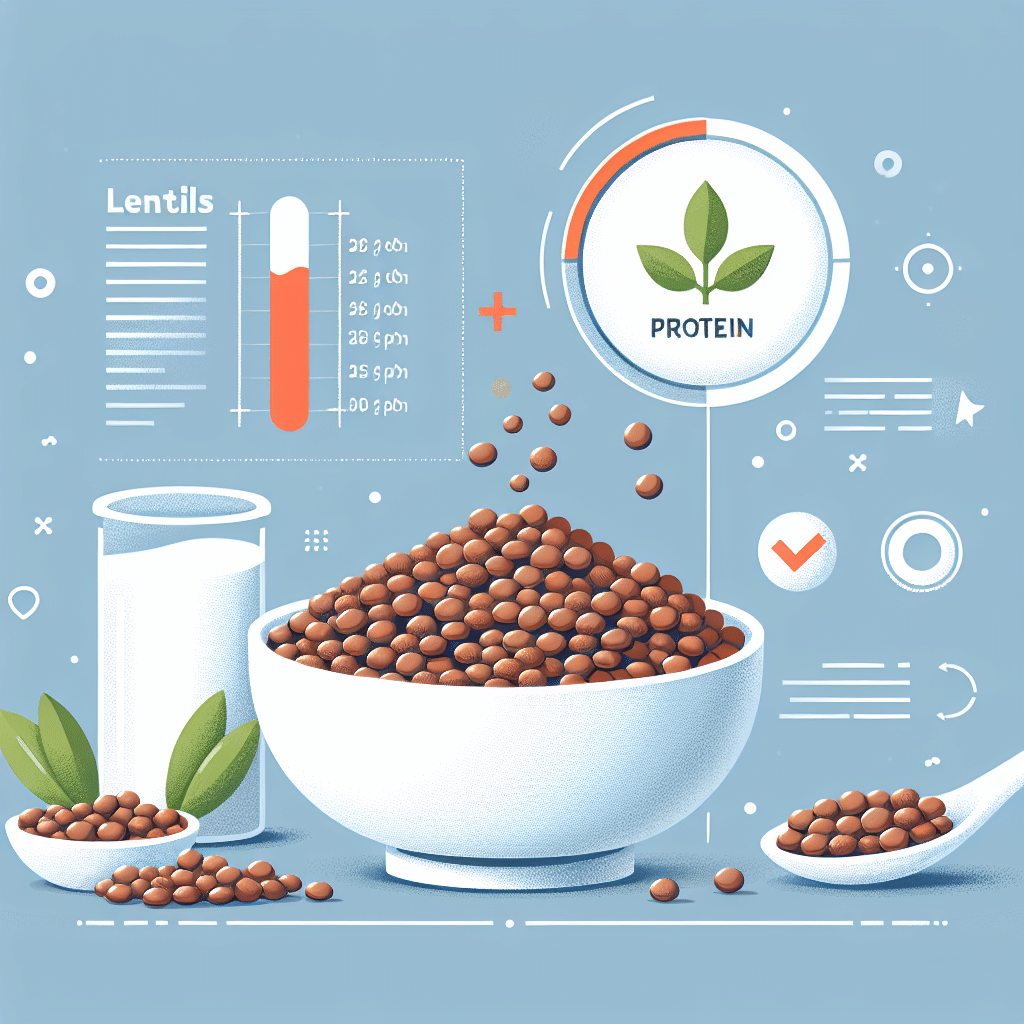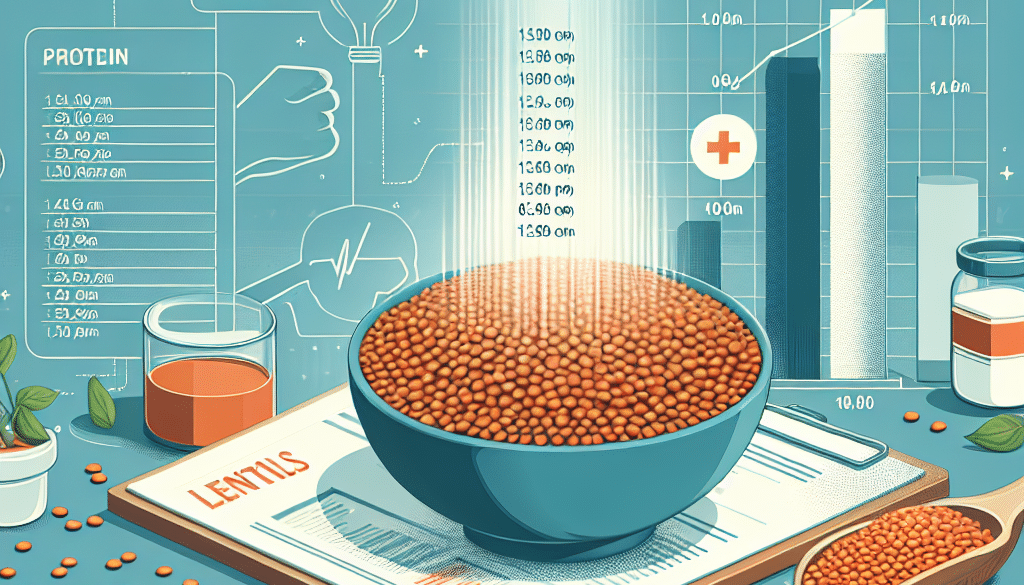Are Lentils A Good Source Of Protein?
-
Table of Contents
- Lentils as a Protein Powerhouse: A Comprehensive Analysis
- Understanding the Protein Content in Lentils
- The Amino Acid Profile of Lentils
- Comparing Lentils to Other Protein Sources
- Health Benefits of Lentil Protein
- Incorporating Lentils into Your Diet
- Conclusion: Lentils as a Protein Staple
- Discover ETprotein’s Plant-Based Protein Products
Lentils as a Protein Powerhouse: A Comprehensive Analysis

Protein is a vital macronutrient essential for the growth, repair, and maintenance of all body tissues. With the increasing interest in plant-based diets, many people are turning to legumes as a primary source of protein. Among these, lentils stand out as a nutritional gem. This article delves into the protein content of lentils, their amino acid profile, and how they compare to other protein sources.
Understanding the Protein Content in Lentils
Lentils are a type of legume known for their lens-shaped seeds. They come in various colors, including green, brown, red, and black, and are a staple in many cuisines worldwide. But are lentils a good source of protein? Let’s look at the facts.
- Lentils boast a high protein content, with about 18 grams of protein per cooked cup (approximately 198 grams), making them one of the best plant-based protein sources available.
- They are cost-effective and accessible, providing a significant protein punch without a hefty price tag, unlike some animal-based proteins.
- Lentils are also rich in other nutrients, including dietary fiber, iron, folate, and potassium, contributing to a well-rounded diet.
The Amino Acid Profile of Lentils
Proteins are made up of amino acids, which are the building blocks essential for various bodily functions. There are nine essential amino acids that the body cannot produce and must be obtained through diet. Lentils contain all nine essential amino acids, making them a complete protein source. However, it’s important to note that lentils, like most plant proteins, have lower amounts of certain amino acids, such as methionine and cysteine.
To overcome this, combining lentils with other protein sources, such as grains, can ensure a more balanced amino acid profile. This practice is common in many cultures, where dishes pair lentils with rice or bread.
Comparing Lentils to Other Protein Sources
When comparing lentils to other protein sources, it’s essential to consider factors such as protein quality, digestibility, and nutritional value.
- Animal Proteins: While animal proteins are complete and highly digestible, they often come with higher levels of saturated fats and cholesterol. Lentils offer a heart-healthy alternative with additional dietary fiber and minimal fat.
- Other Plant Proteins: Lentils stand out among plant proteins for their iron content and lack of anti-nutritional factors found in raw soybeans and raw kidney beans, which can interfere with protein absorption.
- Protein Supplements: Although protein powders provide concentrated protein, they lack the additional nutrients found in whole foods like lentils. Moreover, whole food sources of protein can promote satiety and have a lower environmental impact.
Health Benefits of Lentil Protein
The benefits of incorporating lentil protein into your diet extend beyond just meeting your protein needs. Here are some additional health advantages:
- Weight Management: The high fiber content in lentils can help you feel full longer, aiding in weight management.
- Blood Sugar Control: Lentils have a low glycemic index, which means they cause a slower rise in blood sugar levels, beneficial for people with diabetes.
- Heart Health: Regular consumption of lentils can contribute to better heart health due to their fiber, folate, and potassium content.
- Digestive Health: The fiber in lentils also supports a healthy digestive system, reducing the risk of constipation and other digestive disorders.
Incorporating Lentils into Your Diet
Adding lentils to your diet is simple and versatile. They can be used in a variety of dishes, such as:
- Soups and stews
- Salads
- Curries and dals
- Veggie burgers and loaves
- Pasta sauces
Lentils are also quick to cook compared to other legumes, with most varieties taking just 20-30 minutes to prepare, and they don’t require pre-soaking.
Conclusion: Lentils as a Protein Staple
In conclusion, lentils are an excellent source of protein, especially for those following a plant-based diet. They provide a complete amino acid profile when combined with grains, are rich in other essential nutrients, and offer numerous health benefits. Whether you’re looking to improve your health, manage your weight, or reduce your environmental footprint, lentils are a versatile and sustainable choice.
Discover ETprotein’s Plant-Based Protein Products
If you’re interested in exploring additional plant-based protein options, ETprotein offers a range of high-quality protein products. Their selection includes organic rice protein, pea protein, and various seed proteins, all characterized by a neutral taste and non-GMO, allergen-free attributes. With L-(+)-Ergothioneine purity over 98%, ETprotein caters to industries such as nutraceuticals, pharmaceuticals, and food and beverage. For those seeking comprehensive protein solutions, ETprotein is a reliable choice.
About ETprotein:
ETprotein, a reputable protein and L-(+)-Ergothioneine (EGT) Chinese factory manufacturer and supplier, is renowned for producing, stocking, exporting, and delivering the highest quality organic bulk vegan proteins and L-(+)-Ergothioneine. They include Organic rice protein, clear rice protein, pea protein, clear pea protein, watermelon seed protein, pumpkin seed protein, sunflower seed protein, mung bean protein, peanut protein, and L-(+)-Ergothioneine EGT Pharmaceutical grade, L-(+)-Ergothioneine EGT food grade, L-(+)-Ergothioneine EGT cosmetic grade, L-(+)-Ergothioneine EGT reference grade and L-(+)-Ergothioneine EGT standard. Their offerings, characterized by a neutral taste, non-GMO, allergen-free attributes, with L-(+)-Ergothioneine purity over 98%, 99%, cater to a diverse range of industries. They serve nutraceutical, pharmaceutical, cosmeceutical, veterinary, as well as food and beverage finished product distributors, traders, and manufacturers across Europe, USA, Canada, Australia, Thailand, Japan, Korea, Brazil, and Chile, among others.
ETprotein specialization includes exporting and delivering tailor-made protein powder and finished nutritional supplements. Their extensive product range covers sectors like Food and Beverage, Sports Nutrition, Weight Management, Dietary Supplements, Health and Wellness Products, and Infant Formula, ensuring comprehensive solutions to meet all your protein needs.
As a trusted company by leading global food and beverage brands and Fortune 500 companies, ETprotein reinforces China’s reputation in the global arena. For more information or to sample their products, please contact them and email sales(at)ETprotein.com today.














